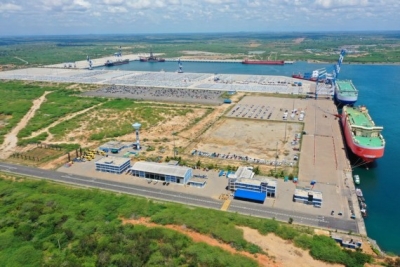China must avoid demands that strain economies of regional allies: Report
By IANS | Updated: August 9, 2025 20:39 IST2025-08-09T20:33:45+5:302025-08-09T20:39:55+5:30
Dhaka, Aug 9 Flagship Chinese projects in Sri Lanka — such as the Colombo Port City and Sinopec's ...

China must avoid demands that strain economies of regional allies: Report
Dhaka, Aug 9 Flagship Chinese projects in Sri Lanka — such as the Colombo Port City and Sinopec's $3.7 billion Hambantota oil refinery — are now entangled in complications the government led by President Anura Kumara Dissanayake is struggling to resolve, a report highlighted on Saturday.
While both sides had lined up multiple ventures, recent issues, including regulatory concerns, have cast doubt on the long-term sustainability of Chinese investments, the report in Daily Sun, a leading newspaper in Bangladesh, detailed.
"In late July 2025, Sri Lanka Customs detained nearly China's 1,000 BYD electric vehicles — mainly the ATTO 3 model—across six consignments. The seizure was due to discrepancies in the declared motor capacity, which directly impacted excise duty calculations," wrote Sulochana Ramiah Mohan, an award-winning journalist and the Deputy Editor of Ceylon Today - a Sri Lanka-based English daily.
During Dissanayake's four-day State Visit to China in January this year, a total of 15 Memorandums of Understanding (MoUs) were signed, covering areas like economic and technical cooperation, agriculture, tourism and media with the most significant agreement being the formalisation of the Sinopec oil refinery project in Hambantota.
According to the report, a major setback to the long-anticipated $3.7 billion Sinopec refinery — a project under negotiation for nearly five years - was the company requesting for an additional 100 acres of land beyond the agreed terms.
"While the original 20 per cent of the refinery's output was to be allocated to the domestic market, with the remainder for export, Sinopec requested that 100 per cent of the refined output be retained for Sri Lankan consumption. This revision has prompted the government to reassess the agreement and even suggested that they may call for a new tender," wrote Mohan.
Such a change, the report mentioned, would disrupt longstanding oil supply arrangements, placing the Lankan government in a difficult position.
The report highlighted that Sri Lanka's Power and Energy Secretary has publicly stated that the government cannot alter the MoU terms or bypass the tender process, even hinting that the agreement might be annulled entirely.
Other projects under China's controversial Belt and Road Initiative (BRI) are also facing pressure.
"Historically, Sri Lanka has been a major BRI participant. Key projects such as the Hambantota Port, Southern and Central Expressways, and the Colombo Port City were all implemented with Chinese financial and technical backing. However, the Hambantota Port—leased to China Merchants Port Holdings on a 99-year agreement after Sri Lanka failed to service its debt — has become a global talking point on the risks of 'debt-trap diplomacy'," the report stated.
The report spotlighted how Bangladesh, which joined the BRI in 2016, is reassessing its investment strategy and the Maldives, which had formally entered the BRI in 2014, is at high risk of debt distress with approximately $1.3–1.4 billion of its public debt — roughly 40 per cent of the total — is owed to China.
Due to rising strategic concerns heightened by Sri Lanka's experience with Chinese-backed debt, no major BRI project has been completed in Nepal this year.
Disclaimer: This post has been auto-published from an agency feed without any modifications to the text and has not been reviewed by an editor
Open in app